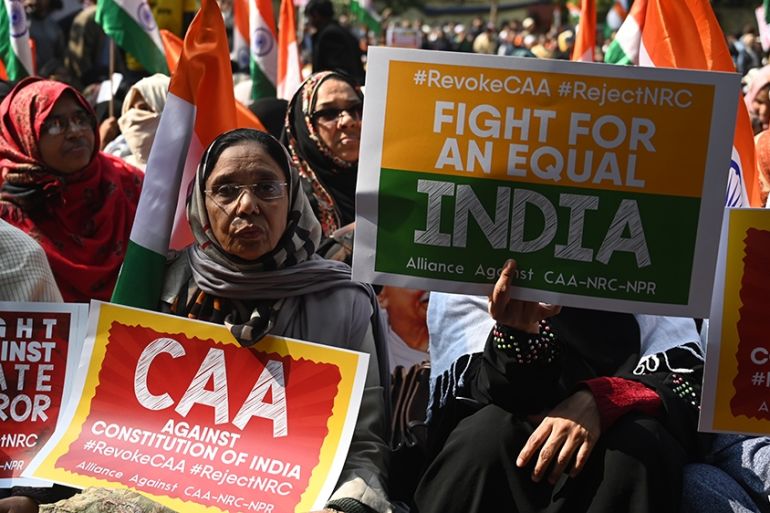India implements ‘anti-Muslim’ 2019 citizenship law weeks before election
Prime Minister Narendra Modi’s government announces rules to implement the controversial law, weeks before he seeks a rare third term in vote due by May.

The Indian government has announced rules to implement the Citizenship Amendment Act (CAA), weeks before Prime Minister Narendra Modi seeks a rare third term for his Hindu nationalist government.
The controversial law passed in 2019 by Modi’s government allowed Indian citizenship for non-Muslim refugees from India’s neighbouring countries.
Keep reading
list of 4 itemsIndia’s Supreme Court refuses to strike down citizenship law
A year after CAA, refugees in India still waiting for citizenship
India citizenship law: Media accused of pro-government coverage
It declared that Hindus, Parsis, Sikhs, Buddhists, Jains and Christians who fled to Hindu-majority India from mainly Muslim Afghanistan, Bangladesh and Pakistan before December 31, 2014, were eligible for citizenship.
The law was declared “anti-Muslim” by several rights groups for keeping the community out of its ambit, raising questions over the secular character of the world’s largest democracy.
Modi’s government had not drafted the rules for the law following nationwide protests over its passage in December 2019.
Violence broke out in the capital, New Delhi, during the protests in which dozens of people, most of them Muslims, were killed and hundreds injured during days of rioting.
“The Modi government announces implementation of Citizenship Amendment Act,” a government spokesman said, according to a Reuters news agency report on Monday.
“It was an integral part of BJP’s 2019 [election] manifesto. This will pave [the] way for the persecuted to find citizenship in India,” he said, referring to the ruling Bharatiya Janata Party (BJP).
Muslim groups say the law, combined with a proposed National Register of Citizens (NRC), can discriminate against India’s 200 million Muslims – the world’s third-largest Muslim population. They fear the government might remove the citizenship of Muslims without documents in some border states.
The government denies accusations that it is anti-Muslim and has defended the law, saying it is needed to help minorities facing persecution in Muslim-majority nations.
It says the law is meant to grant citizenship, not take it away from anyone, and has called the earlier protests politically motivated.
Rising Islamophobia
Human rights groups have alleged that the mistreatment of Muslims has increased under Modi, who took over as prime minister in 2014.
The country, since then, has seen a rising number of attacks against Muslims and their livelihoods, including the demolition of Muslim homes and properties.
Cases of mob lynching under the pretext of protecting cows, considered holy by some Hindus, have also increased during Modi’s time in power.
Critics believe the often-armed cow vigilantes, which used to operate on the fringes of society, became mainstream after the BJP took over.
Reports of hate speech against Muslims have also increased in the country, averaging nearly two anti-Muslim hate speech events per day in 2023.
A report revealed that three out of four hate speech incidents occurred in states ruled by the BJP.
